Taxation Law: Detailed Case Studies on Australian Tax Principles
VerifiedAdded on 2023/06/14
|19
|4385
|71
Case Study
AI Summary
This assignment provides solutions to four distinct scenarios related to Australian taxation law. The first scenario assesses Kate's residency status while working in Fiji, considering factors like domicile and intention to return to Australia. The second scenario analyzes whether income from illegal drug sales and lottery winnings are assessable under ITAA 1936. The third scenario examines the tax implications of Bernie receiving free accommodation in exchange for delivery services, focusing on non-cash benefits. Finally, the fourth scenario determines if a termination payment received by Melanie for a canceled cleaning contract is assessable income under ITAA 1997. The analysis incorporates relevant case law and legislative provisions to provide comprehensive conclusions for each scenario.
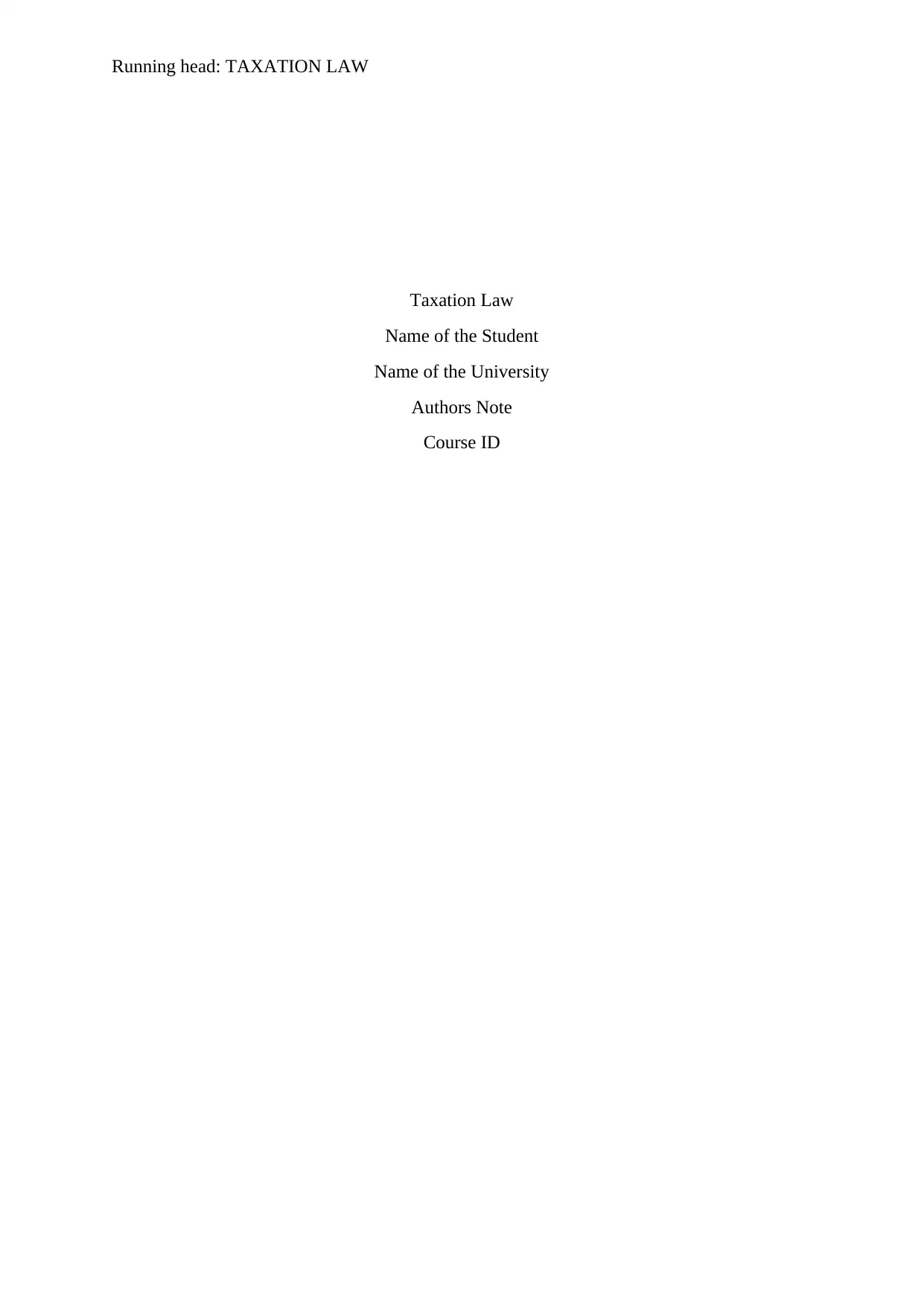
Running head: TAXATION LAW
Taxation Law
Name of the Student
Name of the University
Authors Note
Course ID
Taxation Law
Name of the Student
Name of the University
Authors Note
Course ID
Paraphrase This Document
Need a fresh take? Get an instant paraphrase of this document with our AI Paraphraser
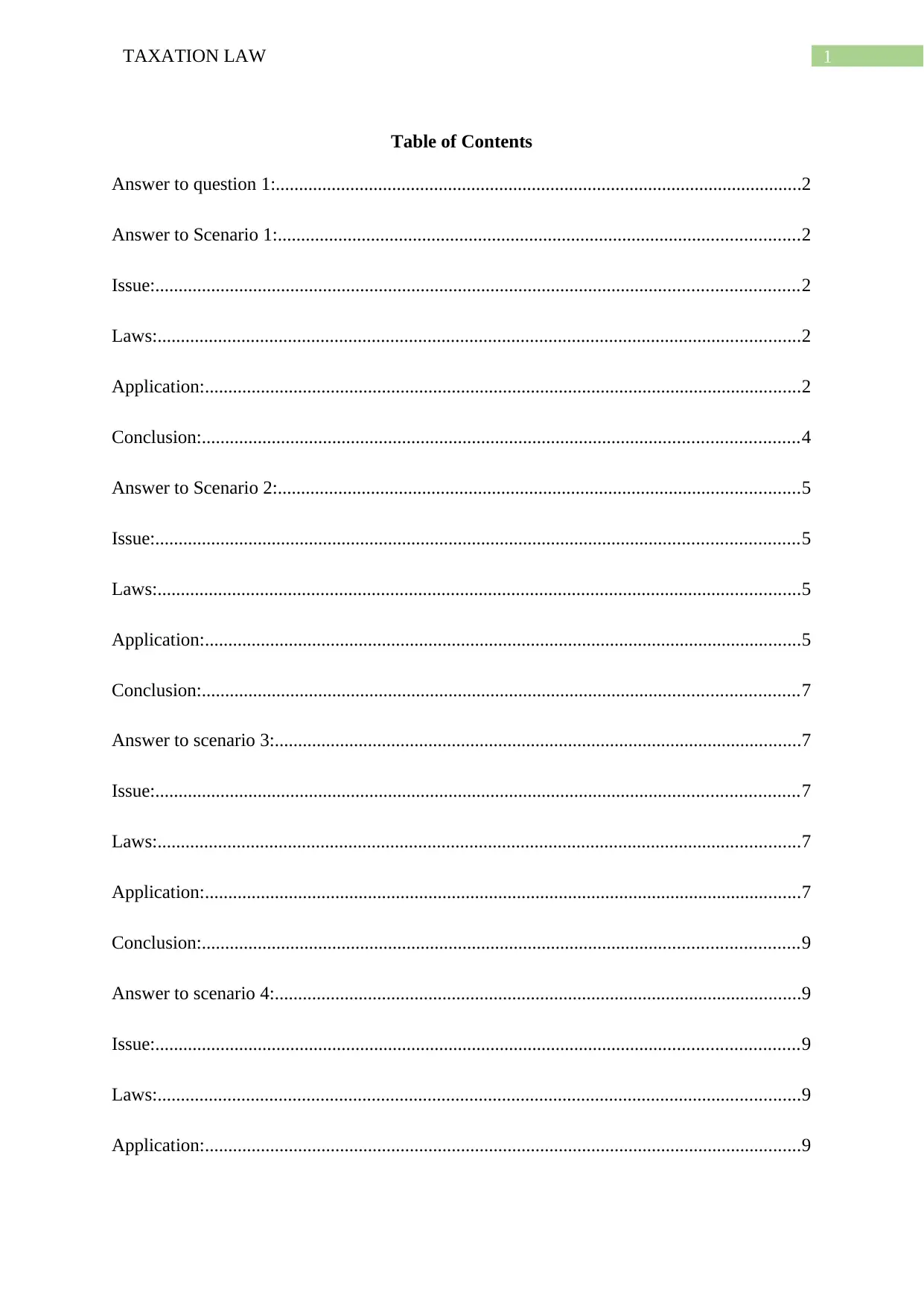
1TAXATION LAW
Table of Contents
Answer to question 1:.................................................................................................................2
Answer to Scenario 1:................................................................................................................2
Issue:..........................................................................................................................................2
Laws:..........................................................................................................................................2
Application:................................................................................................................................2
Conclusion:................................................................................................................................4
Answer to Scenario 2:................................................................................................................5
Issue:..........................................................................................................................................5
Laws:..........................................................................................................................................5
Application:................................................................................................................................5
Conclusion:................................................................................................................................7
Answer to scenario 3:.................................................................................................................7
Issue:..........................................................................................................................................7
Laws:..........................................................................................................................................7
Application:................................................................................................................................7
Conclusion:................................................................................................................................9
Answer to scenario 4:.................................................................................................................9
Issue:..........................................................................................................................................9
Laws:..........................................................................................................................................9
Application:................................................................................................................................9
Table of Contents
Answer to question 1:.................................................................................................................2
Answer to Scenario 1:................................................................................................................2
Issue:..........................................................................................................................................2
Laws:..........................................................................................................................................2
Application:................................................................................................................................2
Conclusion:................................................................................................................................4
Answer to Scenario 2:................................................................................................................5
Issue:..........................................................................................................................................5
Laws:..........................................................................................................................................5
Application:................................................................................................................................5
Conclusion:................................................................................................................................7
Answer to scenario 3:.................................................................................................................7
Issue:..........................................................................................................................................7
Laws:..........................................................................................................................................7
Application:................................................................................................................................7
Conclusion:................................................................................................................................9
Answer to scenario 4:.................................................................................................................9
Issue:..........................................................................................................................................9
Laws:..........................................................................................................................................9
Application:................................................................................................................................9
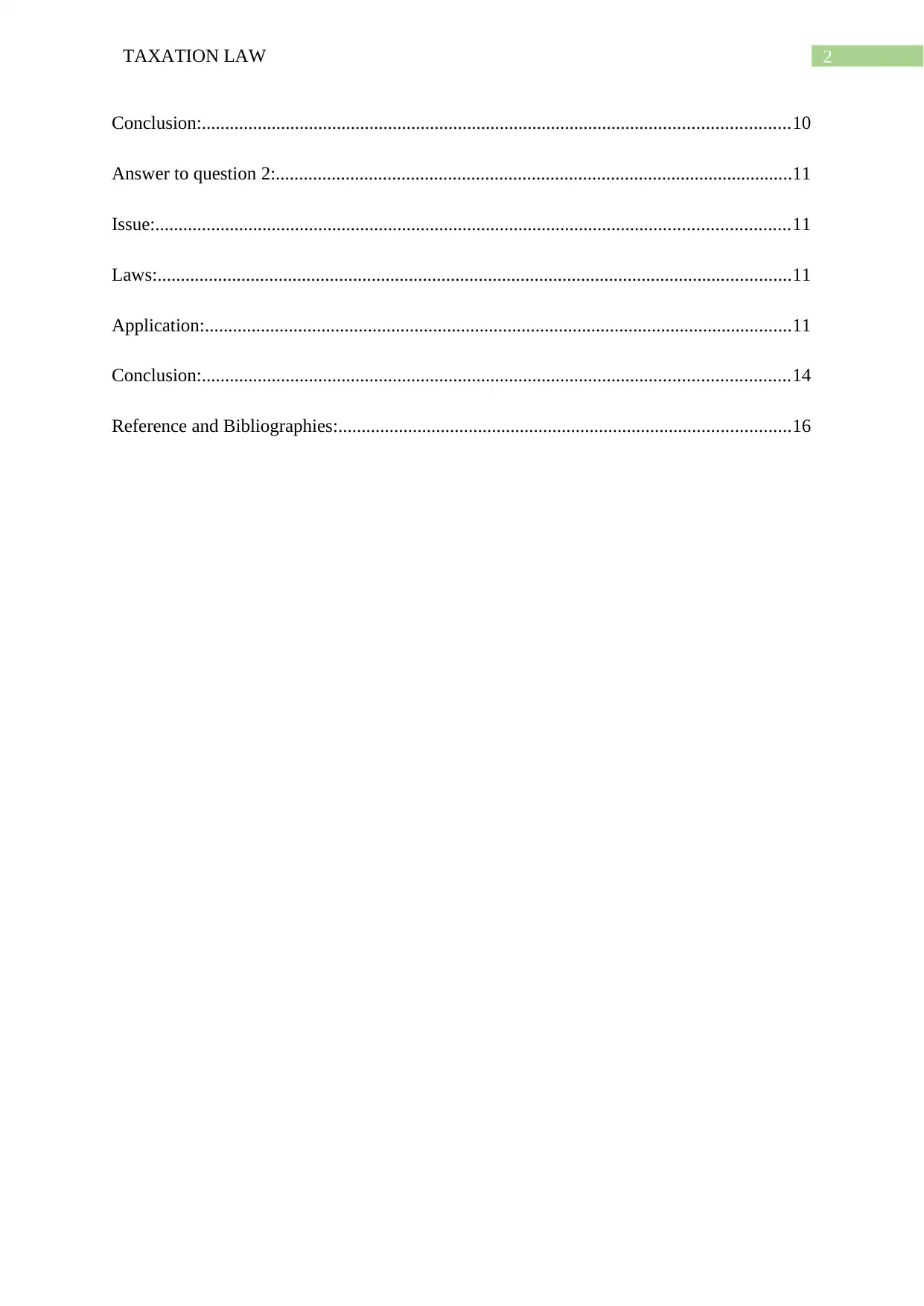
2TAXATION LAW
Conclusion:..............................................................................................................................10
Answer to question 2:...............................................................................................................11
Issue:........................................................................................................................................11
Laws:........................................................................................................................................11
Application:..............................................................................................................................11
Conclusion:..............................................................................................................................14
Reference and Bibliographies:.................................................................................................16
Conclusion:..............................................................................................................................10
Answer to question 2:...............................................................................................................11
Issue:........................................................................................................................................11
Laws:........................................................................................................................................11
Application:..............................................................................................................................11
Conclusion:..............................................................................................................................14
Reference and Bibliographies:.................................................................................................16
⊘ This is a preview!⊘
Do you want full access?
Subscribe today to unlock all pages.

Trusted by 1+ million students worldwide
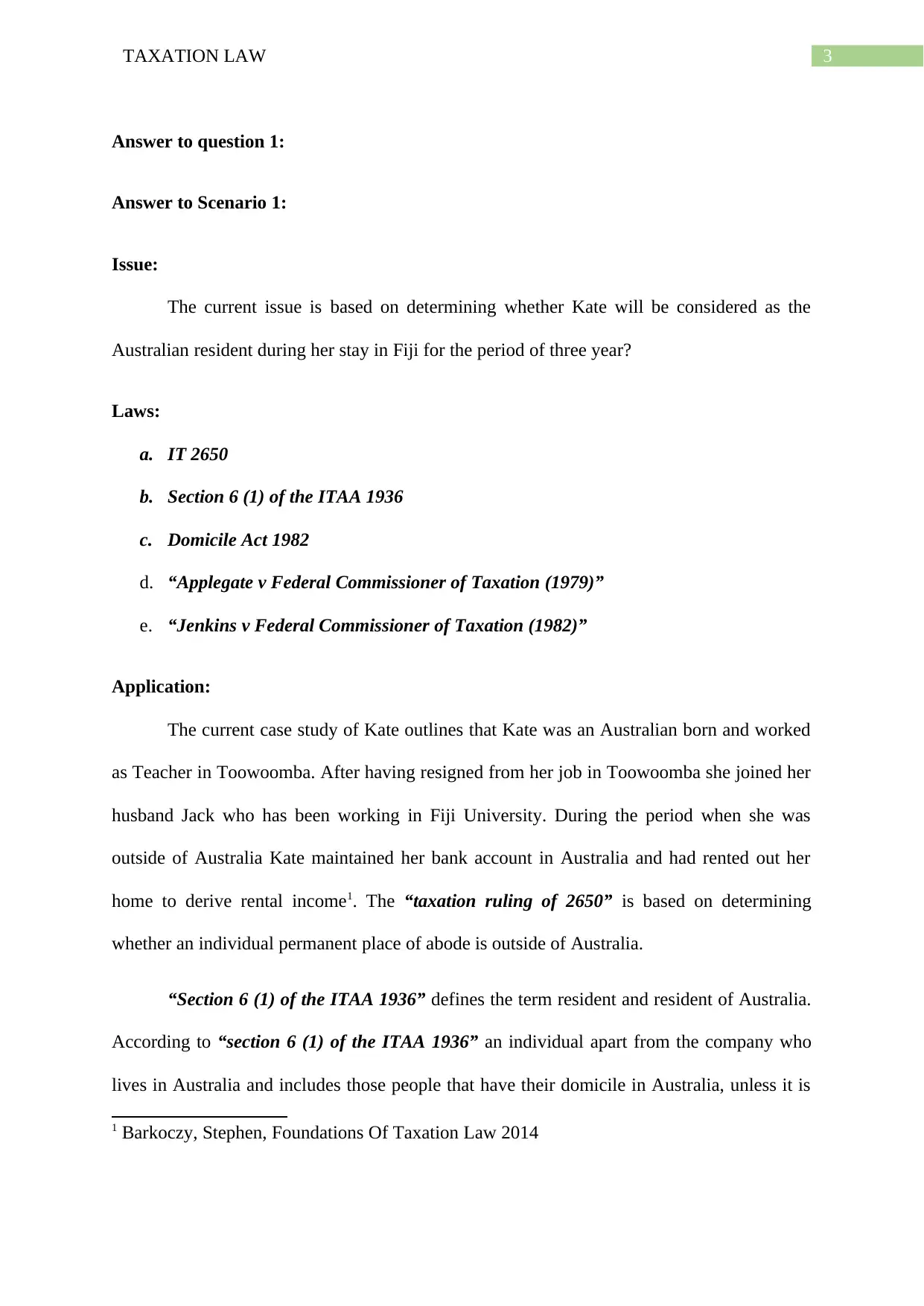
3TAXATION LAW
Answer to question 1:
Answer to Scenario 1:
Issue:
The current issue is based on determining whether Kate will be considered as the
Australian resident during her stay in Fiji for the period of three year?
Laws:
a. IT 2650
b. Section 6 (1) of the ITAA 1936
c. Domicile Act 1982
d. “Applegate v Federal Commissioner of Taxation (1979)”
e. “Jenkins v Federal Commissioner of Taxation (1982)”
Application:
The current case study of Kate outlines that Kate was an Australian born and worked
as Teacher in Toowoomba. After having resigned from her job in Toowoomba she joined her
husband Jack who has been working in Fiji University. During the period when she was
outside of Australia Kate maintained her bank account in Australia and had rented out her
home to derive rental income1. The “taxation ruling of 2650” is based on determining
whether an individual permanent place of abode is outside of Australia.
“Section 6 (1) of the ITAA 1936” defines the term resident and resident of Australia.
According to “section 6 (1) of the ITAA 1936” an individual apart from the company who
lives in Australia and includes those people that have their domicile in Australia, unless it is
1 Barkoczy, Stephen, Foundations Of Taxation Law 2014
Answer to question 1:
Answer to Scenario 1:
Issue:
The current issue is based on determining whether Kate will be considered as the
Australian resident during her stay in Fiji for the period of three year?
Laws:
a. IT 2650
b. Section 6 (1) of the ITAA 1936
c. Domicile Act 1982
d. “Applegate v Federal Commissioner of Taxation (1979)”
e. “Jenkins v Federal Commissioner of Taxation (1982)”
Application:
The current case study of Kate outlines that Kate was an Australian born and worked
as Teacher in Toowoomba. After having resigned from her job in Toowoomba she joined her
husband Jack who has been working in Fiji University. During the period when she was
outside of Australia Kate maintained her bank account in Australia and had rented out her
home to derive rental income1. The “taxation ruling of 2650” is based on determining
whether an individual permanent place of abode is outside of Australia.
“Section 6 (1) of the ITAA 1936” defines the term resident and resident of Australia.
According to “section 6 (1) of the ITAA 1936” an individual apart from the company who
lives in Australia and includes those people that have their domicile in Australia, unless it is
1 Barkoczy, Stephen, Foundations Of Taxation Law 2014
Paraphrase This Document
Need a fresh take? Get an instant paraphrase of this document with our AI Paraphraser
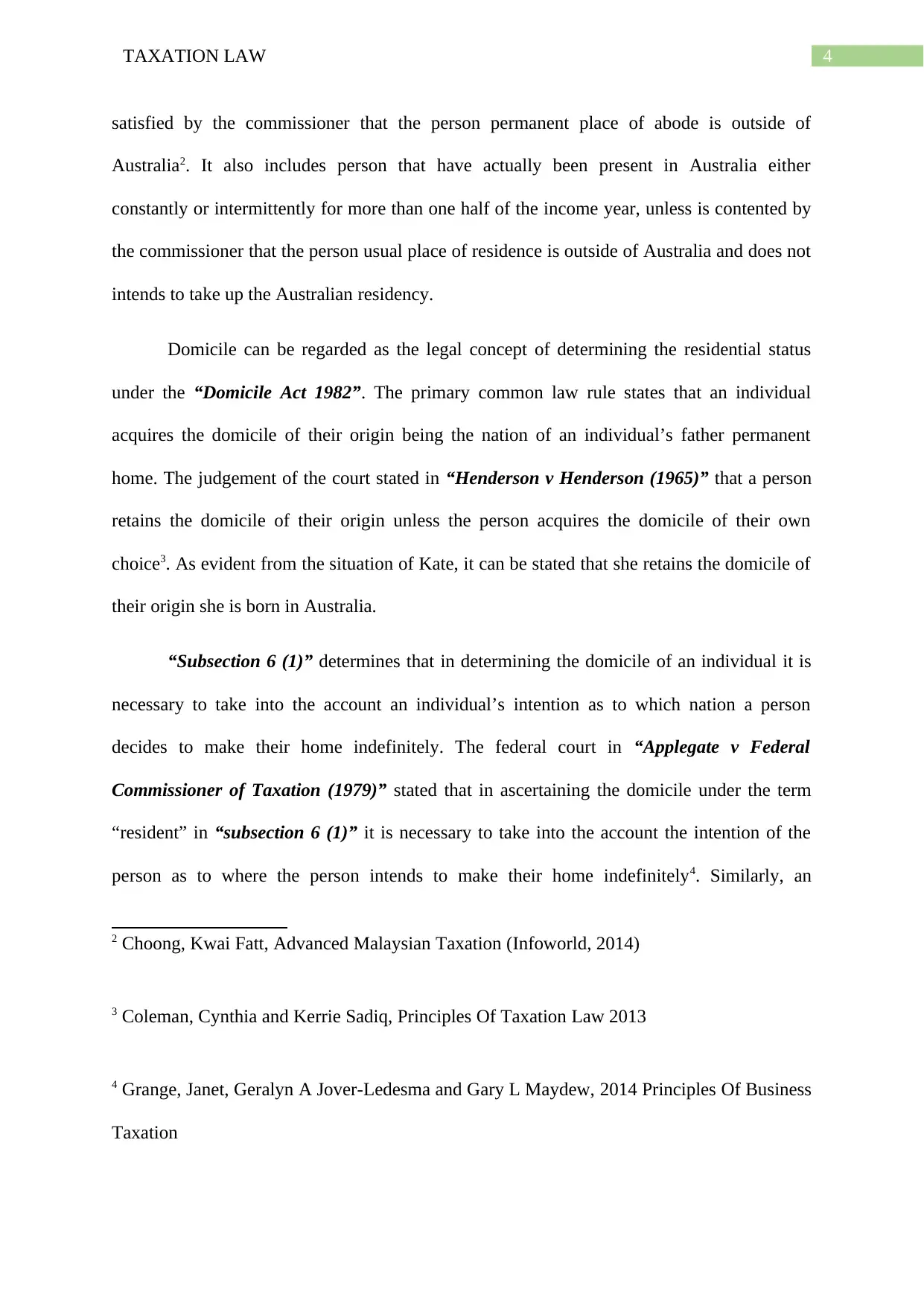
4TAXATION LAW
satisfied by the commissioner that the person permanent place of abode is outside of
Australia2. It also includes person that have actually been present in Australia either
constantly or intermittently for more than one half of the income year, unless is contented by
the commissioner that the person usual place of residence is outside of Australia and does not
intends to take up the Australian residency.
Domicile can be regarded as the legal concept of determining the residential status
under the “Domicile Act 1982”. The primary common law rule states that an individual
acquires the domicile of their origin being the nation of an individual’s father permanent
home. The judgement of the court stated in “Henderson v Henderson (1965)” that a person
retains the domicile of their origin unless the person acquires the domicile of their own
choice3. As evident from the situation of Kate, it can be stated that she retains the domicile of
their origin she is born in Australia.
“Subsection 6 (1)” determines that in determining the domicile of an individual it is
necessary to take into the account an individual’s intention as to which nation a person
decides to make their home indefinitely. The federal court in “Applegate v Federal
Commissioner of Taxation (1979)” stated that in ascertaining the domicile under the term
“resident” in “subsection 6 (1)” it is necessary to take into the account the intention of the
person as to where the person intends to make their home indefinitely4. Similarly, an
2 Choong, Kwai Fatt, Advanced Malaysian Taxation (Infoworld, 2014)
3 Coleman, Cynthia and Kerrie Sadiq, Principles Of Taxation Law 2013
4 Grange, Janet, Geralyn A Jover-Ledesma and Gary L Maydew, 2014 Principles Of Business
Taxation
satisfied by the commissioner that the person permanent place of abode is outside of
Australia2. It also includes person that have actually been present in Australia either
constantly or intermittently for more than one half of the income year, unless is contented by
the commissioner that the person usual place of residence is outside of Australia and does not
intends to take up the Australian residency.
Domicile can be regarded as the legal concept of determining the residential status
under the “Domicile Act 1982”. The primary common law rule states that an individual
acquires the domicile of their origin being the nation of an individual’s father permanent
home. The judgement of the court stated in “Henderson v Henderson (1965)” that a person
retains the domicile of their origin unless the person acquires the domicile of their own
choice3. As evident from the situation of Kate, it can be stated that she retains the domicile of
their origin she is born in Australia.
“Subsection 6 (1)” determines that in determining the domicile of an individual it is
necessary to take into the account an individual’s intention as to which nation a person
decides to make their home indefinitely. The federal court in “Applegate v Federal
Commissioner of Taxation (1979)” stated that in ascertaining the domicile under the term
“resident” in “subsection 6 (1)” it is necessary to take into the account the intention of the
person as to where the person intends to make their home indefinitely4. Similarly, an
2 Choong, Kwai Fatt, Advanced Malaysian Taxation (Infoworld, 2014)
3 Coleman, Cynthia and Kerrie Sadiq, Principles Of Taxation Law 2013
4 Grange, Janet, Geralyn A Jover-Ledesma and Gary L Maydew, 2014 Principles Of Business
Taxation
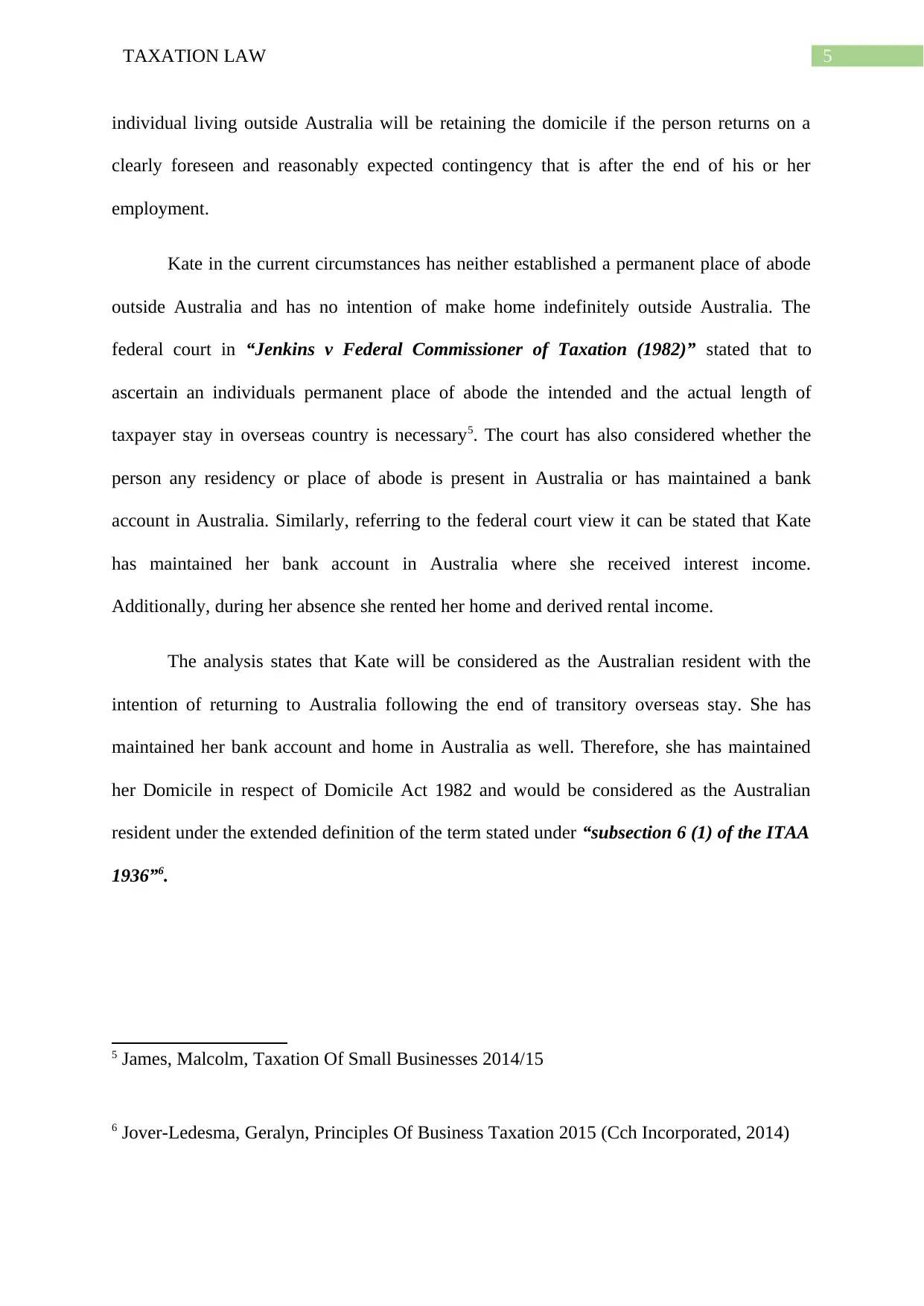
5TAXATION LAW
individual living outside Australia will be retaining the domicile if the person returns on a
clearly foreseen and reasonably expected contingency that is after the end of his or her
employment.
Kate in the current circumstances has neither established a permanent place of abode
outside Australia and has no intention of make home indefinitely outside Australia. The
federal court in “Jenkins v Federal Commissioner of Taxation (1982)” stated that to
ascertain an individuals permanent place of abode the intended and the actual length of
taxpayer stay in overseas country is necessary5. The court has also considered whether the
person any residency or place of abode is present in Australia or has maintained a bank
account in Australia. Similarly, referring to the federal court view it can be stated that Kate
has maintained her bank account in Australia where she received interest income.
Additionally, during her absence she rented her home and derived rental income.
The analysis states that Kate will be considered as the Australian resident with the
intention of returning to Australia following the end of transitory overseas stay. She has
maintained her bank account and home in Australia as well. Therefore, she has maintained
her Domicile in respect of Domicile Act 1982 and would be considered as the Australian
resident under the extended definition of the term stated under “subsection 6 (1) of the ITAA
1936”6.
5 James, Malcolm, Taxation Of Small Businesses 2014/15
6 Jover-Ledesma, Geralyn, Principles Of Business Taxation 2015 (Cch Incorporated, 2014)
individual living outside Australia will be retaining the domicile if the person returns on a
clearly foreseen and reasonably expected contingency that is after the end of his or her
employment.
Kate in the current circumstances has neither established a permanent place of abode
outside Australia and has no intention of make home indefinitely outside Australia. The
federal court in “Jenkins v Federal Commissioner of Taxation (1982)” stated that to
ascertain an individuals permanent place of abode the intended and the actual length of
taxpayer stay in overseas country is necessary5. The court has also considered whether the
person any residency or place of abode is present in Australia or has maintained a bank
account in Australia. Similarly, referring to the federal court view it can be stated that Kate
has maintained her bank account in Australia where she received interest income.
Additionally, during her absence she rented her home and derived rental income.
The analysis states that Kate will be considered as the Australian resident with the
intention of returning to Australia following the end of transitory overseas stay. She has
maintained her bank account and home in Australia as well. Therefore, she has maintained
her Domicile in respect of Domicile Act 1982 and would be considered as the Australian
resident under the extended definition of the term stated under “subsection 6 (1) of the ITAA
1936”6.
5 James, Malcolm, Taxation Of Small Businesses 2014/15
6 Jover-Ledesma, Geralyn, Principles Of Business Taxation 2015 (Cch Incorporated, 2014)
⊘ This is a preview!⊘
Do you want full access?
Subscribe today to unlock all pages.

Trusted by 1+ million students worldwide
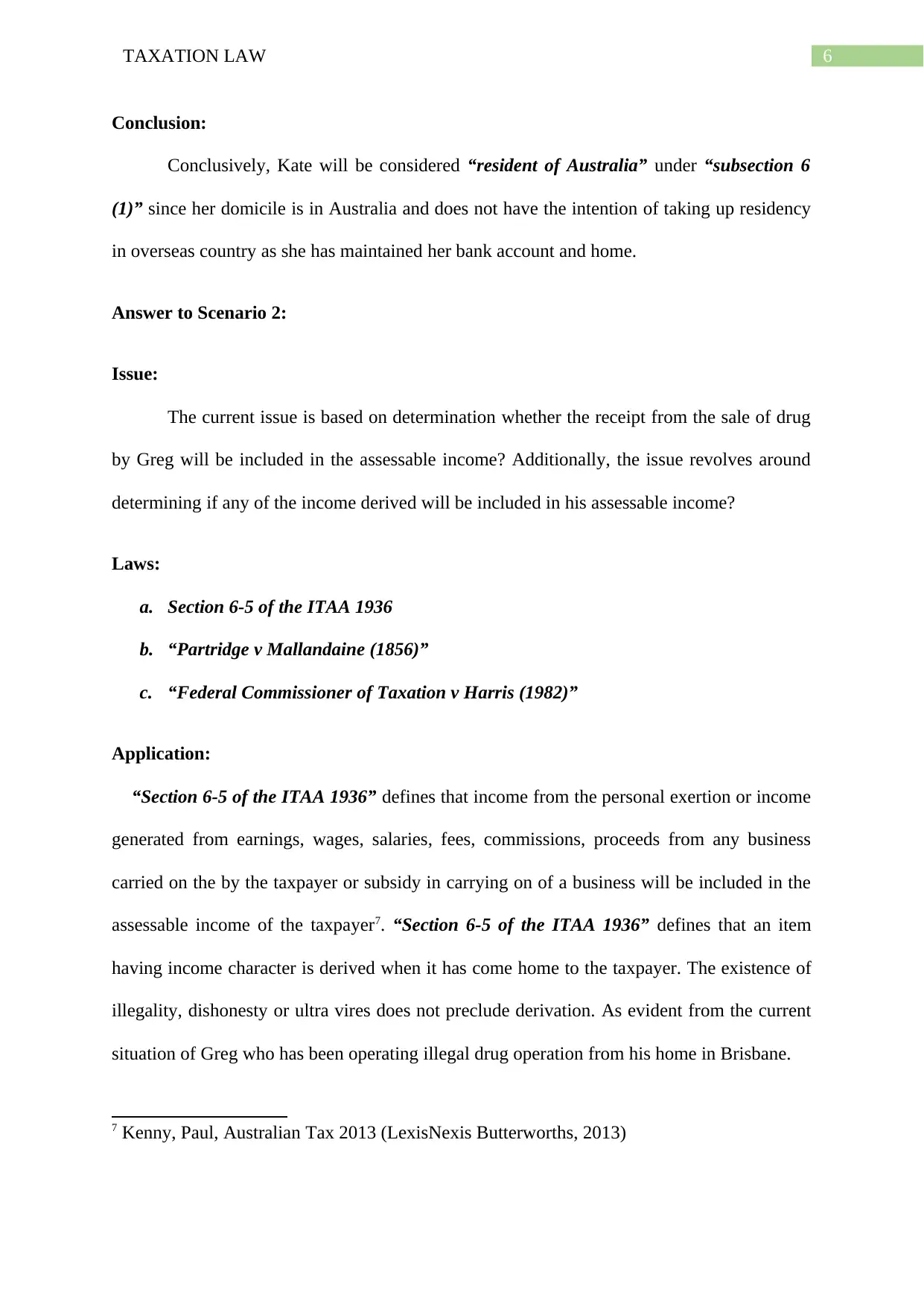
6TAXATION LAW
Conclusion:
Conclusively, Kate will be considered “resident of Australia” under “subsection 6
(1)” since her domicile is in Australia and does not have the intention of taking up residency
in overseas country as she has maintained her bank account and home.
Answer to Scenario 2:
Issue:
The current issue is based on determination whether the receipt from the sale of drug
by Greg will be included in the assessable income? Additionally, the issue revolves around
determining if any of the income derived will be included in his assessable income?
Laws:
a. Section 6-5 of the ITAA 1936
b. “Partridge v Mallandaine (1856)”
c. “Federal Commissioner of Taxation v Harris (1982)”
Application:
“Section 6-5 of the ITAA 1936” defines that income from the personal exertion or income
generated from earnings, wages, salaries, fees, commissions, proceeds from any business
carried on the by the taxpayer or subsidy in carrying on of a business will be included in the
assessable income of the taxpayer7. “Section 6-5 of the ITAA 1936” defines that an item
having income character is derived when it has come home to the taxpayer. The existence of
illegality, dishonesty or ultra vires does not preclude derivation. As evident from the current
situation of Greg who has been operating illegal drug operation from his home in Brisbane.
7 Kenny, Paul, Australian Tax 2013 (LexisNexis Butterworths, 2013)
Conclusion:
Conclusively, Kate will be considered “resident of Australia” under “subsection 6
(1)” since her domicile is in Australia and does not have the intention of taking up residency
in overseas country as she has maintained her bank account and home.
Answer to Scenario 2:
Issue:
The current issue is based on determination whether the receipt from the sale of drug
by Greg will be included in the assessable income? Additionally, the issue revolves around
determining if any of the income derived will be included in his assessable income?
Laws:
a. Section 6-5 of the ITAA 1936
b. “Partridge v Mallandaine (1856)”
c. “Federal Commissioner of Taxation v Harris (1982)”
Application:
“Section 6-5 of the ITAA 1936” defines that income from the personal exertion or income
generated from earnings, wages, salaries, fees, commissions, proceeds from any business
carried on the by the taxpayer or subsidy in carrying on of a business will be included in the
assessable income of the taxpayer7. “Section 6-5 of the ITAA 1936” defines that an item
having income character is derived when it has come home to the taxpayer. The existence of
illegality, dishonesty or ultra vires does not preclude derivation. As evident from the current
situation of Greg who has been operating illegal drug operation from his home in Brisbane.
7 Kenny, Paul, Australian Tax 2013 (LexisNexis Butterworths, 2013)
Paraphrase This Document
Need a fresh take? Get an instant paraphrase of this document with our AI Paraphraser
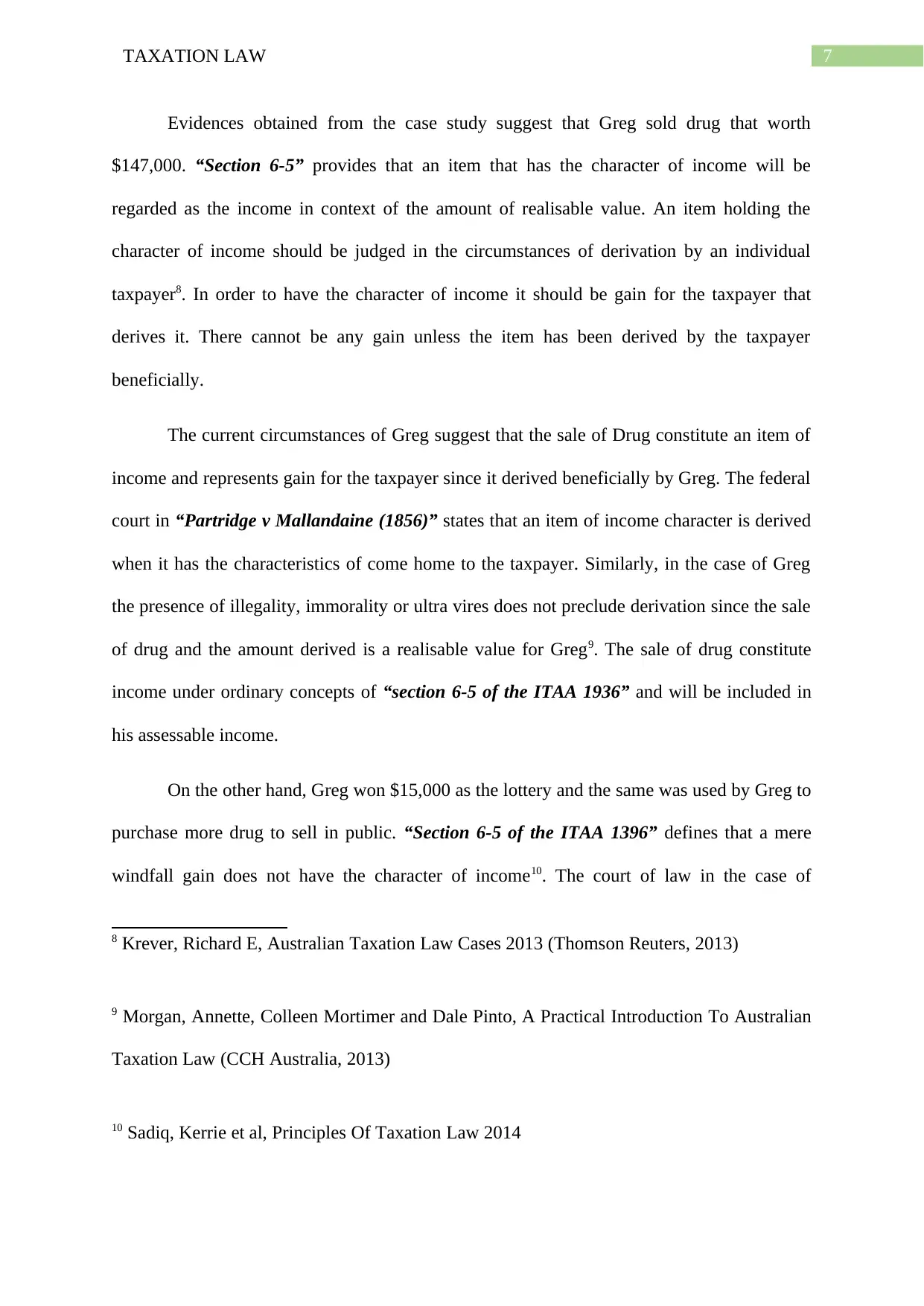
7TAXATION LAW
Evidences obtained from the case study suggest that Greg sold drug that worth
$147,000. “Section 6-5” provides that an item that has the character of income will be
regarded as the income in context of the amount of realisable value. An item holding the
character of income should be judged in the circumstances of derivation by an individual
taxpayer8. In order to have the character of income it should be gain for the taxpayer that
derives it. There cannot be any gain unless the item has been derived by the taxpayer
beneficially.
The current circumstances of Greg suggest that the sale of Drug constitute an item of
income and represents gain for the taxpayer since it derived beneficially by Greg. The federal
court in “Partridge v Mallandaine (1856)” states that an item of income character is derived
when it has the characteristics of come home to the taxpayer. Similarly, in the case of Greg
the presence of illegality, immorality or ultra vires does not preclude derivation since the sale
of drug and the amount derived is a realisable value for Greg9. The sale of drug constitute
income under ordinary concepts of “section 6-5 of the ITAA 1936” and will be included in
his assessable income.
On the other hand, Greg won $15,000 as the lottery and the same was used by Greg to
purchase more drug to sell in public. “Section 6-5 of the ITAA 1396” defines that a mere
windfall gain does not have the character of income10. The court of law in the case of
8 Krever, Richard E, Australian Taxation Law Cases 2013 (Thomson Reuters, 2013)
9 Morgan, Annette, Colleen Mortimer and Dale Pinto, A Practical Introduction To Australian
Taxation Law (CCH Australia, 2013)
10 Sadiq, Kerrie et al, Principles Of Taxation Law 2014
Evidences obtained from the case study suggest that Greg sold drug that worth
$147,000. “Section 6-5” provides that an item that has the character of income will be
regarded as the income in context of the amount of realisable value. An item holding the
character of income should be judged in the circumstances of derivation by an individual
taxpayer8. In order to have the character of income it should be gain for the taxpayer that
derives it. There cannot be any gain unless the item has been derived by the taxpayer
beneficially.
The current circumstances of Greg suggest that the sale of Drug constitute an item of
income and represents gain for the taxpayer since it derived beneficially by Greg. The federal
court in “Partridge v Mallandaine (1856)” states that an item of income character is derived
when it has the characteristics of come home to the taxpayer. Similarly, in the case of Greg
the presence of illegality, immorality or ultra vires does not preclude derivation since the sale
of drug and the amount derived is a realisable value for Greg9. The sale of drug constitute
income under ordinary concepts of “section 6-5 of the ITAA 1936” and will be included in
his assessable income.
On the other hand, Greg won $15,000 as the lottery and the same was used by Greg to
purchase more drug to sell in public. “Section 6-5 of the ITAA 1396” defines that a mere
windfall gain does not have the character of income10. The court of law in the case of
8 Krever, Richard E, Australian Taxation Law Cases 2013 (Thomson Reuters, 2013)
9 Morgan, Annette, Colleen Mortimer and Dale Pinto, A Practical Introduction To Australian
Taxation Law (CCH Australia, 2013)
10 Sadiq, Kerrie et al, Principles Of Taxation Law 2014
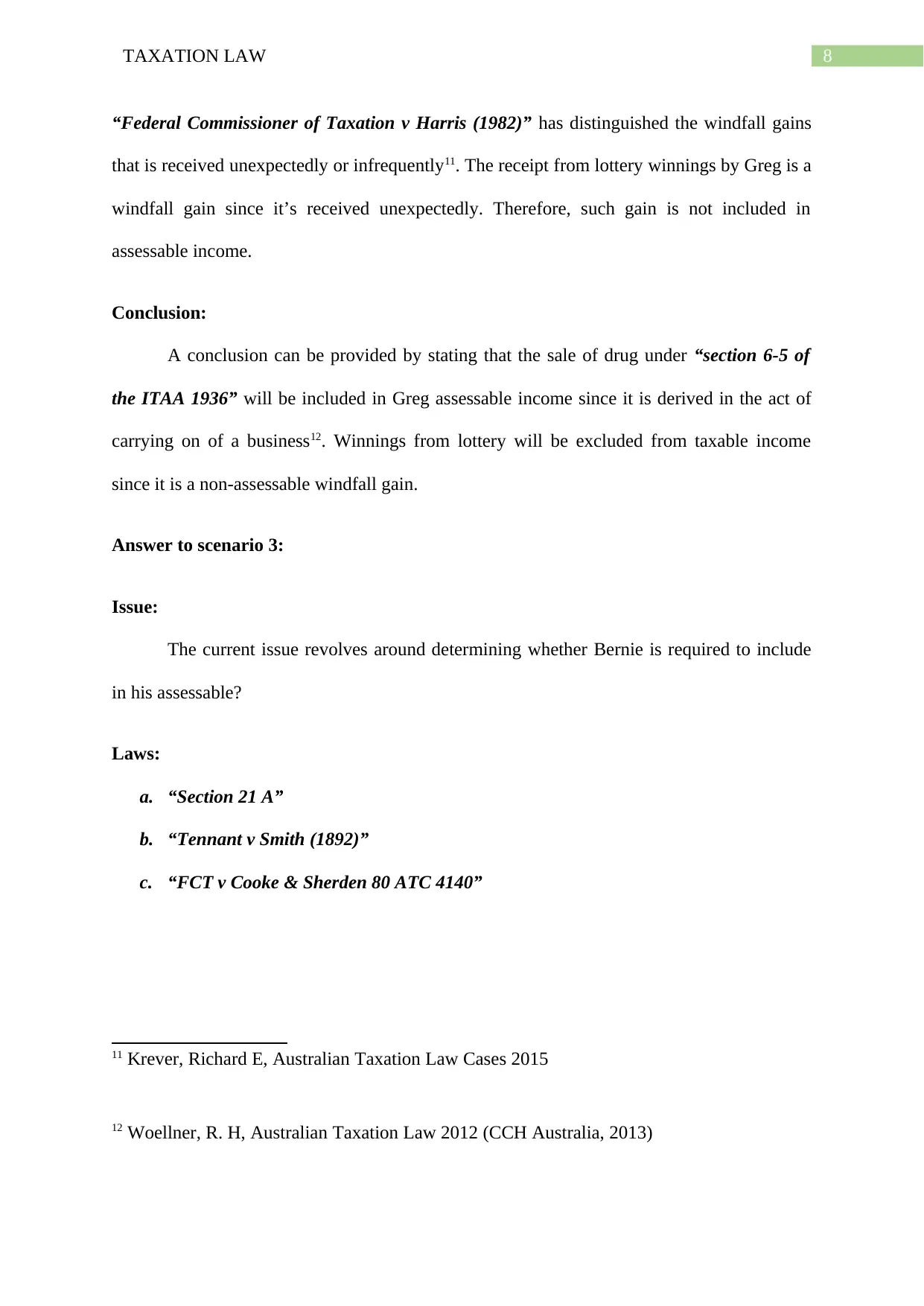
8TAXATION LAW
“Federal Commissioner of Taxation v Harris (1982)” has distinguished the windfall gains
that is received unexpectedly or infrequently11. The receipt from lottery winnings by Greg is a
windfall gain since it’s received unexpectedly. Therefore, such gain is not included in
assessable income.
Conclusion:
A conclusion can be provided by stating that the sale of drug under “section 6-5 of
the ITAA 1936” will be included in Greg assessable income since it is derived in the act of
carrying on of a business12. Winnings from lottery will be excluded from taxable income
since it is a non-assessable windfall gain.
Answer to scenario 3:
Issue:
The current issue revolves around determining whether Bernie is required to include
in his assessable?
Laws:
a. “Section 21 A”
b. “Tennant v Smith (1892)”
c. “FCT v Cooke & Sherden 80 ATC 4140”
11 Krever, Richard E, Australian Taxation Law Cases 2015
12 Woellner, R. H, Australian Taxation Law 2012 (CCH Australia, 2013)
“Federal Commissioner of Taxation v Harris (1982)” has distinguished the windfall gains
that is received unexpectedly or infrequently11. The receipt from lottery winnings by Greg is a
windfall gain since it’s received unexpectedly. Therefore, such gain is not included in
assessable income.
Conclusion:
A conclusion can be provided by stating that the sale of drug under “section 6-5 of
the ITAA 1936” will be included in Greg assessable income since it is derived in the act of
carrying on of a business12. Winnings from lottery will be excluded from taxable income
since it is a non-assessable windfall gain.
Answer to scenario 3:
Issue:
The current issue revolves around determining whether Bernie is required to include
in his assessable?
Laws:
a. “Section 21 A”
b. “Tennant v Smith (1892)”
c. “FCT v Cooke & Sherden 80 ATC 4140”
11 Krever, Richard E, Australian Taxation Law Cases 2015
12 Woellner, R. H, Australian Taxation Law 2012 (CCH Australia, 2013)
⊘ This is a preview!⊘
Do you want full access?
Subscribe today to unlock all pages.

Trusted by 1+ million students worldwide
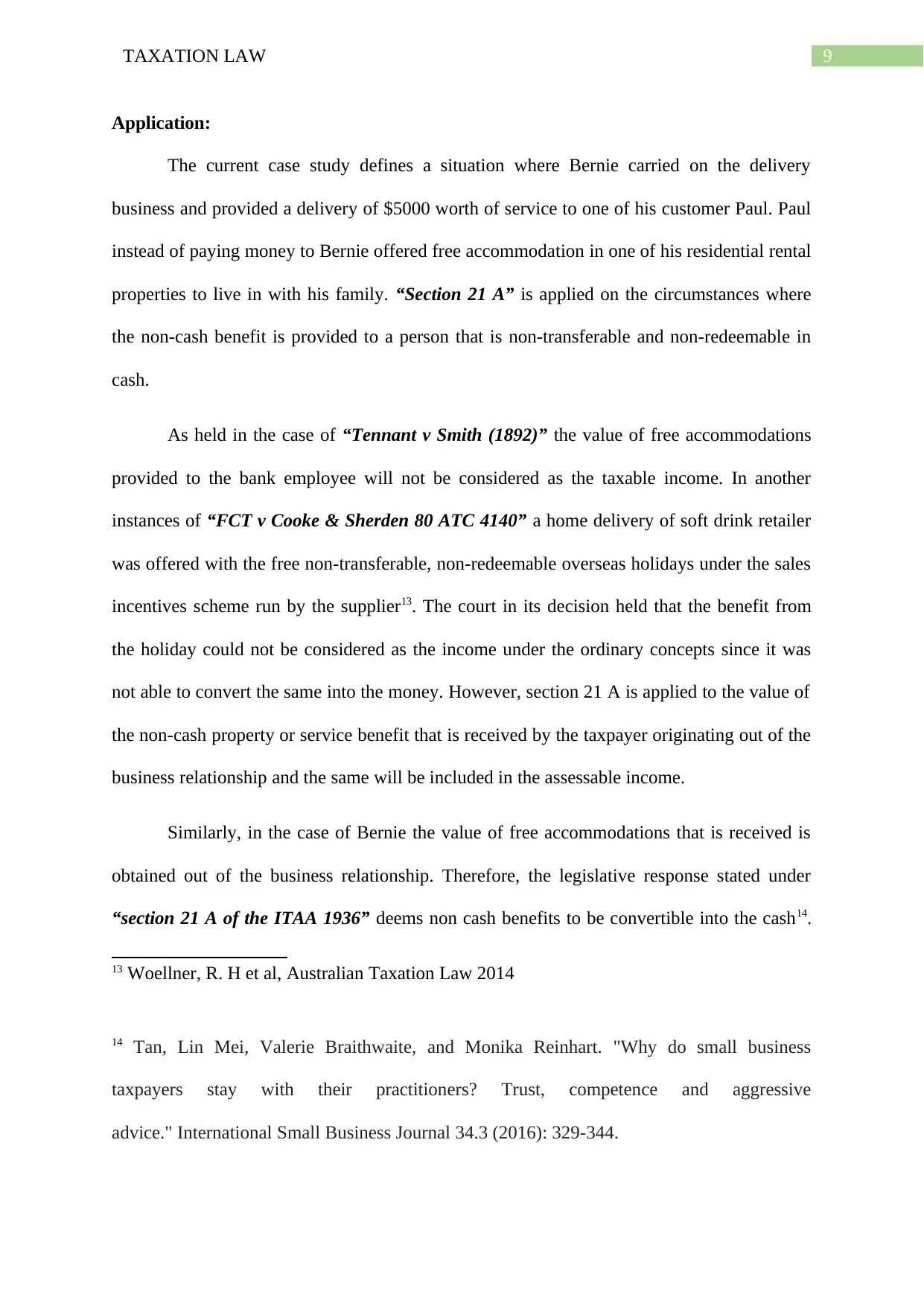
9TAXATION LAW
Application:
The current case study defines a situation where Bernie carried on the delivery
business and provided a delivery of $5000 worth of service to one of his customer Paul. Paul
instead of paying money to Bernie offered free accommodation in one of his residential rental
properties to live in with his family. “Section 21 A” is applied on the circumstances where
the non-cash benefit is provided to a person that is non-transferable and non-redeemable in
cash.
As held in the case of “Tennant v Smith (1892)” the value of free accommodations
provided to the bank employee will not be considered as the taxable income. In another
instances of “FCT v Cooke & Sherden 80 ATC 4140” a home delivery of soft drink retailer
was offered with the free non-transferable, non-redeemable overseas holidays under the sales
incentives scheme run by the supplier13. The court in its decision held that the benefit from
the holiday could not be considered as the income under the ordinary concepts since it was
not able to convert the same into the money. However, section 21 A is applied to the value of
the non-cash property or service benefit that is received by the taxpayer originating out of the
business relationship and the same will be included in the assessable income.
Similarly, in the case of Bernie the value of free accommodations that is received is
obtained out of the business relationship. Therefore, the legislative response stated under
“section 21 A of the ITAA 1936” deems non cash benefits to be convertible into the cash14.
13 Woellner, R. H et al, Australian Taxation Law 2014
14 Tan, Lin Mei, Valerie Braithwaite, and Monika Reinhart. "Why do small business
taxpayers stay with their practitioners? Trust, competence and aggressive
advice." International Small Business Journal 34.3 (2016): 329-344.
Application:
The current case study defines a situation where Bernie carried on the delivery
business and provided a delivery of $5000 worth of service to one of his customer Paul. Paul
instead of paying money to Bernie offered free accommodation in one of his residential rental
properties to live in with his family. “Section 21 A” is applied on the circumstances where
the non-cash benefit is provided to a person that is non-transferable and non-redeemable in
cash.
As held in the case of “Tennant v Smith (1892)” the value of free accommodations
provided to the bank employee will not be considered as the taxable income. In another
instances of “FCT v Cooke & Sherden 80 ATC 4140” a home delivery of soft drink retailer
was offered with the free non-transferable, non-redeemable overseas holidays under the sales
incentives scheme run by the supplier13. The court in its decision held that the benefit from
the holiday could not be considered as the income under the ordinary concepts since it was
not able to convert the same into the money. However, section 21 A is applied to the value of
the non-cash property or service benefit that is received by the taxpayer originating out of the
business relationship and the same will be included in the assessable income.
Similarly, in the case of Bernie the value of free accommodations that is received is
obtained out of the business relationship. Therefore, the legislative response stated under
“section 21 A of the ITAA 1936” deems non cash benefits to be convertible into the cash14.
13 Woellner, R. H et al, Australian Taxation Law 2014
14 Tan, Lin Mei, Valerie Braithwaite, and Monika Reinhart. "Why do small business
taxpayers stay with their practitioners? Trust, competence and aggressive
advice." International Small Business Journal 34.3 (2016): 329-344.
Paraphrase This Document
Need a fresh take? Get an instant paraphrase of this document with our AI Paraphraser
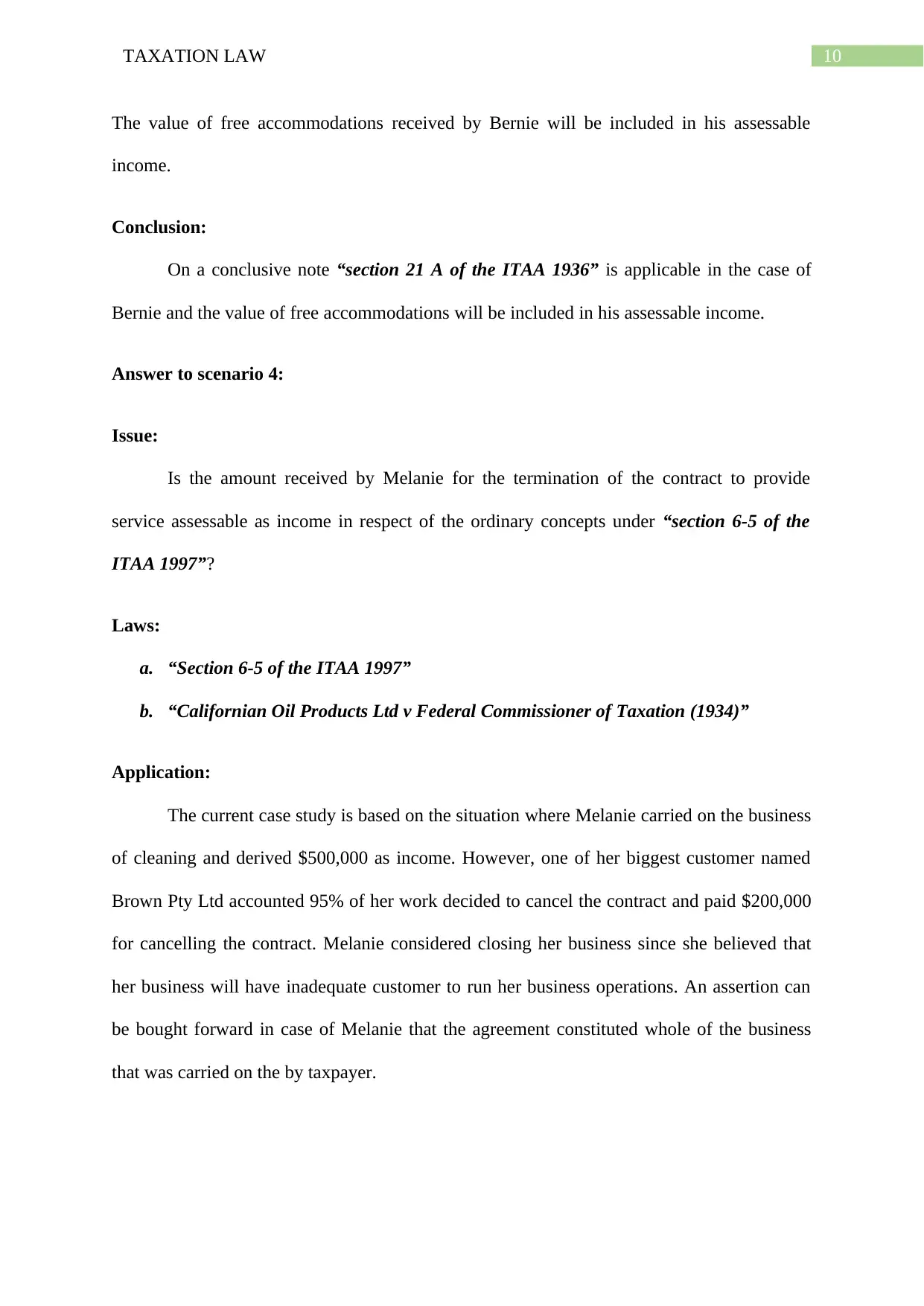
10TAXATION LAW
The value of free accommodations received by Bernie will be included in his assessable
income.
Conclusion:
On a conclusive note “section 21 A of the ITAA 1936” is applicable in the case of
Bernie and the value of free accommodations will be included in his assessable income.
Answer to scenario 4:
Issue:
Is the amount received by Melanie for the termination of the contract to provide
service assessable as income in respect of the ordinary concepts under “section 6-5 of the
ITAA 1997”?
Laws:
a. “Section 6-5 of the ITAA 1997”
b. “Californian Oil Products Ltd v Federal Commissioner of Taxation (1934)”
Application:
The current case study is based on the situation where Melanie carried on the business
of cleaning and derived $500,000 as income. However, one of her biggest customer named
Brown Pty Ltd accounted 95% of her work decided to cancel the contract and paid $200,000
for cancelling the contract. Melanie considered closing her business since she believed that
her business will have inadequate customer to run her business operations. An assertion can
be bought forward in case of Melanie that the agreement constituted whole of the business
that was carried on the by taxpayer.
The value of free accommodations received by Bernie will be included in his assessable
income.
Conclusion:
On a conclusive note “section 21 A of the ITAA 1936” is applicable in the case of
Bernie and the value of free accommodations will be included in his assessable income.
Answer to scenario 4:
Issue:
Is the amount received by Melanie for the termination of the contract to provide
service assessable as income in respect of the ordinary concepts under “section 6-5 of the
ITAA 1997”?
Laws:
a. “Section 6-5 of the ITAA 1997”
b. “Californian Oil Products Ltd v Federal Commissioner of Taxation (1934)”
Application:
The current case study is based on the situation where Melanie carried on the business
of cleaning and derived $500,000 as income. However, one of her biggest customer named
Brown Pty Ltd accounted 95% of her work decided to cancel the contract and paid $200,000
for cancelling the contract. Melanie considered closing her business since she believed that
her business will have inadequate customer to run her business operations. An assertion can
be bought forward in case of Melanie that the agreement constituted whole of the business
that was carried on the by taxpayer.
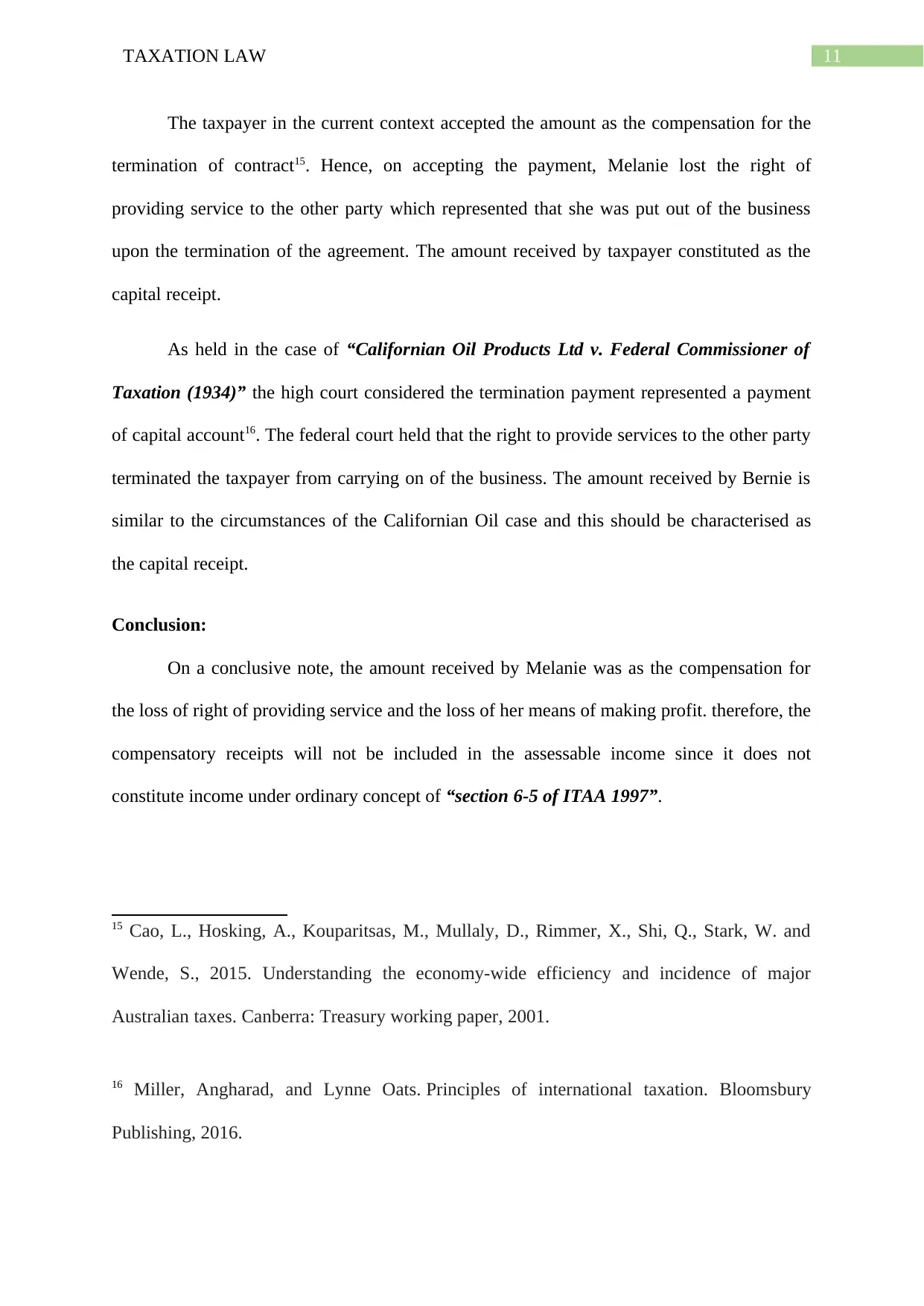
11TAXATION LAW
The taxpayer in the current context accepted the amount as the compensation for the
termination of contract15. Hence, on accepting the payment, Melanie lost the right of
providing service to the other party which represented that she was put out of the business
upon the termination of the agreement. The amount received by taxpayer constituted as the
capital receipt.
As held in the case of “Californian Oil Products Ltd v. Federal Commissioner of
Taxation (1934)” the high court considered the termination payment represented a payment
of capital account16. The federal court held that the right to provide services to the other party
terminated the taxpayer from carrying on of the business. The amount received by Bernie is
similar to the circumstances of the Californian Oil case and this should be characterised as
the capital receipt.
Conclusion:
On a conclusive note, the amount received by Melanie was as the compensation for
the loss of right of providing service and the loss of her means of making profit. therefore, the
compensatory receipts will not be included in the assessable income since it does not
constitute income under ordinary concept of “section 6-5 of ITAA 1997”.
15 Cao, L., Hosking, A., Kouparitsas, M., Mullaly, D., Rimmer, X., Shi, Q., Stark, W. and
Wende, S., 2015. Understanding the economy-wide efficiency and incidence of major
Australian taxes. Canberra: Treasury working paper, 2001.
16 Miller, Angharad, and Lynne Oats. Principles of international taxation. Bloomsbury
Publishing, 2016.
The taxpayer in the current context accepted the amount as the compensation for the
termination of contract15. Hence, on accepting the payment, Melanie lost the right of
providing service to the other party which represented that she was put out of the business
upon the termination of the agreement. The amount received by taxpayer constituted as the
capital receipt.
As held in the case of “Californian Oil Products Ltd v. Federal Commissioner of
Taxation (1934)” the high court considered the termination payment represented a payment
of capital account16. The federal court held that the right to provide services to the other party
terminated the taxpayer from carrying on of the business. The amount received by Bernie is
similar to the circumstances of the Californian Oil case and this should be characterised as
the capital receipt.
Conclusion:
On a conclusive note, the amount received by Melanie was as the compensation for
the loss of right of providing service and the loss of her means of making profit. therefore, the
compensatory receipts will not be included in the assessable income since it does not
constitute income under ordinary concept of “section 6-5 of ITAA 1997”.
15 Cao, L., Hosking, A., Kouparitsas, M., Mullaly, D., Rimmer, X., Shi, Q., Stark, W. and
Wende, S., 2015. Understanding the economy-wide efficiency and incidence of major
Australian taxes. Canberra: Treasury working paper, 2001.
16 Miller, Angharad, and Lynne Oats. Principles of international taxation. Bloomsbury
Publishing, 2016.
⊘ This is a preview!⊘
Do you want full access?
Subscribe today to unlock all pages.

Trusted by 1+ million students worldwide
1 out of 19
Related Documents
Your All-in-One AI-Powered Toolkit for Academic Success.
+13062052269
info@desklib.com
Available 24*7 on WhatsApp / Email
![[object Object]](/_next/static/media/star-bottom.7253800d.svg)
Unlock your academic potential
Copyright © 2020–2026 A2Z Services. All Rights Reserved. Developed and managed by ZUCOL.





